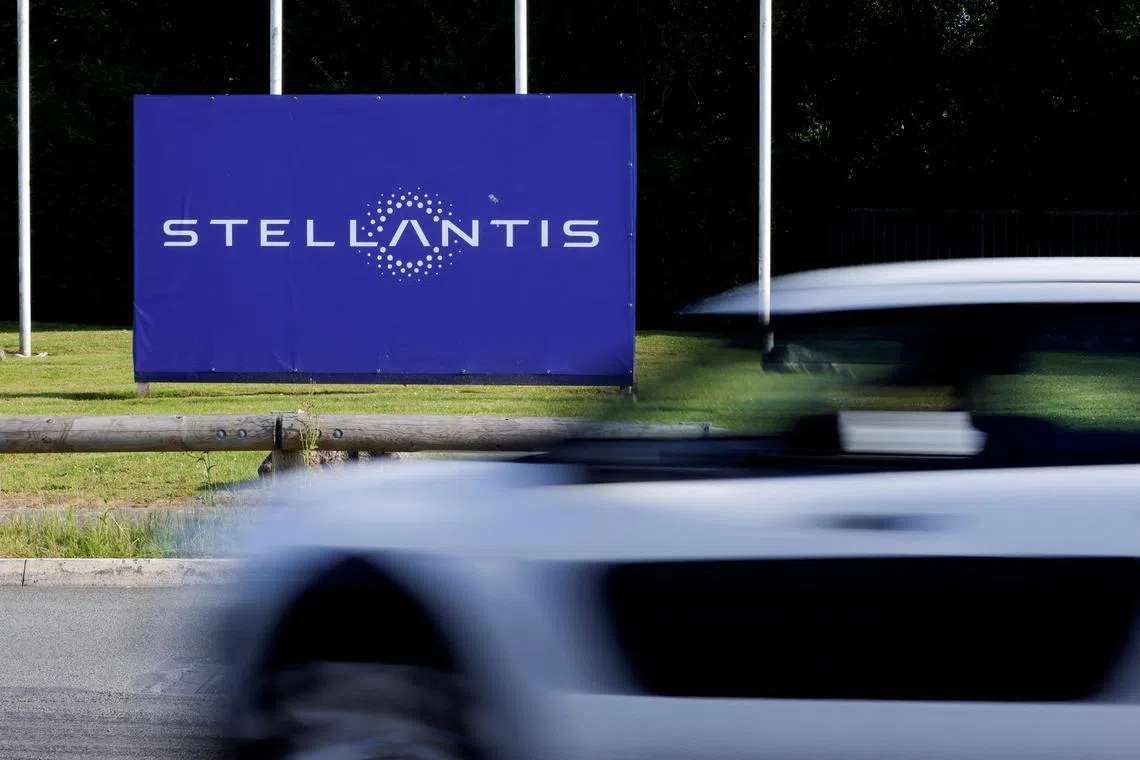Stellantis and Samsung will get $9.4 billion to build battery factories in US
Sign up now: Get ST's newsletters delivered to your inbox

The federal loan will make it easier for Stellantis, which also owns Peugeot, Fiat and several other brands, to compete in the market for electric cars.
PHOTO: REUTERS
Follow topic:
The Biden administration expanded its efforts to lock in its climate policies Dec 2, saying that it would lend almost US$7 billion (S$9.37 billion) to help build battery factories in Indiana to supply vehicles made by Stellantis, the owner of Jeep, Chrysler, Dodge and Ram.
The financing, which was the second multi-billion-dollar loan related to electric vehicle (EV) manufacturing in a week, is part of the administration’s efforts to create domestic supplies of batteries.
President-elect Donald Trump has vowed to reverse Biden administration policies aimed at promoting EV manufacturing. Transportation is the biggest source of greenhouse gases in the United States.
Last week, the Department of Energy said it would lend US$6 billion to help Rivian build an electric car factory in Georgia.
Rivian, a relatively new company that makes only EVs, plans to produce sport utility vehicles and hatchbacks at the factory, in Social Circle, near Atlanta.
The loan announced Dec 2, for US$6.85 billion not including interest, will be used to finance two battery plants in Kokomo, Indiana, that are being built by StarPlus Energy, a joint venture between Stellantis and Samsung SDI, a South Korean company.
The factories will employ 2,800 people once they are up and running and 3,200 workers during construction. The plants will be capable of making batteries for 670,000 vehicles a year, the Department of Energy said.
The loan agreements for StarPlus and Rivian will be binding once the government and the companies sign final contracts, which is expected to take place before Mr Trump’s inauguration in January.
As has often been the case with the Biden administration’s clean energy funds, both projects are in congressional districts represented by Republicans, who have generally been opposed to using federal money to promote the manufacturing of electric cars.
Still, some of them may be unwilling to get in the way of projects that bring thousands of jobs and billions of dollars to their districts.
Carmakers have also asked Trump not to roll back tax provisions that support sales of electric vehicles.
In addition to promoting sales of EVs, the Biden administration has sought to establish domestic sources of lithium and other materials used to make batteries. China currently dominates the battery supply chain.
The Indiana factories “will greatly expand EV battery manufacturing capacity in North America and reduce America’s reliance on adversarial foreign nations like China”, the Department of Energy’s Loan Programmes Office said in a statement.
Sales of EVs have fallen short of some projections, but they still rose 11 per cent in the third quarter, while sales of petrol cars were flat, according to Cox Automotive.
The Biden administration has offered tax credits of up to US$7,500 and other incentives intended to ensure that half of all cars sold by 2030 are electric, up from 9 per cent in 2024.
Trump and his Republican allies in Congress have vowed to eliminate the incentives and other environmental policies they have said effectively force carmakers to sell EVs that buyers do not want.
Stellantis has not been a major presence in the US electric car market, but it is rolling out several new battery-powered models in the coming months, including versions of the Jeep Wagoneer SUV, Dodge Charger muscle cars and Ram pick-ups.
The federal loan will make it easier for Stellantis, which also owns Peugeot, Fiat and several other brands, to compete in the market for electric cars. The company has lost market share in the US and is under financial pressure after sales worldwide fell 27 per cent in the third quarter compared with a year earlier.
Stellantis announced Dec 1 that its chief executive Carlos Tavares had resigned.
The Biden administration has lent almost US$34 billion to support manufacturing of low-emission or zero-emission vehicles, including the Rivian and Stellantis projects.
The loans carry interest rates comparable to what the federal government pays on Treasury notes. NYTIMES

